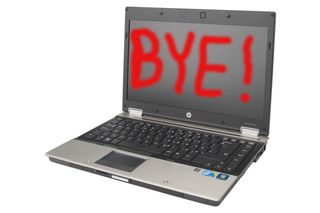Goodbye HP PCs, long live webOS!
Inside the Enterprise: HP has ditched webOS and wants to spin off its PC division, but businesses need to buy their devices from someone.

It seems that HP has decided to "do an IBM" and leave the PC business. Not only that, but the computer maker immediately shut down its webOS tablet and smart phone operations, prompting retailers to hold fire sales for remaining webOS stock.
Accordingly, Dixons Retail the owner of Currys and PC World sold out of HP TouchPads before they even officially went on sale at the knockdown price of 89 for the 16GB model. Bargain hunters flocked to buy a "cheap" tablet, even though the TouchPad has few available apps. This, in turn, prompted some observers to claim that HP is being short sighted in ditching webOS, which it acquired when it bought Palm.
The decision to close down webOS, and possibly spin off the PC unit, is the end of a grand vision for HP. The company has bought several household names over the years, among them DEC, Palm, 3Com and above all, Compaq. Only a year ago, HP executives were trumpeting HP's status as the world's largest IT vendor, and the only one to produce everything from smartphones to supercomputers. Not any more.
Margins are just that much better, higher up the stack. With the odd exception (Apple again), we are likely to see a cluster of generic hardware makers producing Windows PCs, and another cluster, developing generic tablets around Android.
The corporate restructuring story at HP should not mask another, more fundamental problem with the IT industry: no-one really makes any money from PCs. In fact, the first ever Inside the Enterprise column looked at the very issue of PC makers' profits. Even executives at the mighty Dell are cagey about how much money they really make from "client" devices, saying only that the business overall makes a profit. The only PC maker that consistently delivers strong profits and margins seems to be Apple, and yet Apple is regularly slated by IT people for its high prices.
Nor is the problem just one that affects PC makers. Based on recent events it affects phones and tablets too; witness Google's purchase of Motorola, Nokia's alliance with Microsoft, and RIM's recent troubles. In that context, HP's decisions are simply on trend.
The interesting point, though, is that first IBM, and now HP, have decided that there is not enough margin in the client devices business, or enough opportunity to cross sell other services to businesses buying PCs, to make it worth its while designing and selling personal computers. Margins are just that much better, higher up the stack. With the odd exception (Apple again), we are likely to see a cluster of generic hardware makers producing Windows PCs, and another cluster, developing generic tablets around Android.
Get the ITPro. daily newsletter
Receive our latest news, industry updates, featured resources and more. Sign up today to receive our FREE report on AI cyber crime & security - newly updated for 2024.
At one level, HP must be applauded for trying to do something different with webOS. Despite the TouchPad's potential, HP executives must believe that it was simply not good enough to take on the iPad and the Android hoards, let alone form a possible springboard for a rival to Windows. That is a shame.
As for webOS itself? Maybe HP could turn it over to the open source community. Then users and developers can decide.
Stephen Pritchard is a contributing editor at IT PRO.
Comments? Questions? You can email him here




